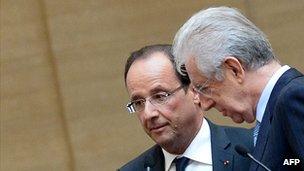Europe: Condition acute for eurozone
- Published
- comments

The French and Italian leaders want Germany to ease its tough stance on austerity
The drumbeat will only get louder in the countdown to the EU summit next week.
It is already being called "the summit to save the euro" - a rather familiar billing! What is different is the chorus of voices sounding the alarm.
In Luxembourg yesterday the head of the IMF, Christine Lagarde, said "we are clearly seeing additional tension and acute stress applying to both banks and sovereigns in the euro area". The words "acute stress" from the IMF are the equivalent of others crying "fire".
The Italian Prime Minister Mario Monti warns today that without a major agreement at next week's summit "there would be progressively speculative attacks on individual countries, with harassment of the weaker countries". With his own ratings falling in Italy, Mr Monti sees growing frustration of the public towards Europe.
Today four leaders - who were only together in Mexico 36 hours ago - will meet in Rome. Germany, France, Italy and Spain are the four largest countries in the eurozone. They will discuss the agenda for next week's summit.
Once again the German Chancellor, Angela Merkel, will find herself outnumbered. There will be more arm-twisting. She must by now be used to it. After all, she has had 12 phone calls, two video conference calls and three face-to-face meetings with President Obama this year. Every conversation urged the Germans to do more.
Big German gesture?
The international community wants the eurozone to demonstrate what - in the final analysis - stands behind the single currency. That, in their view, means Germany. They are looking for the big gesture. Christine Lagarde called for a "determined and forceful move towards complete monetary union".
France's President Hollande is turning out to be the key player in exerting pressure on Germany. He has openly challenged the German strategy for tackling Europe's debt crisis. Austerity first, in his view, is not working. He wants the emphasis to be on growth. The Italians and Spanish are on his side.
In the past few weeks, as borrowing costs for Spain and Italy have soared, so the agenda has widened. Both the European Commission and many of the eurozone countries essentially want Germany to commit its taxpayers' money to standing behind the euro.
Take a banking union. EU officials and others would like to see supervision of big banks at a European level. They would also like to see a joint bank deposit guarantee scheme and a fund for winding down banks.
The Germans are fine with more supervision, but they are not going to make German funds liable for every failed eurozone bank. (At next week's summit all 27 countries in the EU are likely to agree to the European Central Bank having a bigger supervisory role.)
Easing bond pressure
Then there is Mario Monti's big idea. He wants money from the eurozone's main rescue funds to be used to buy bonds from countries like his own, to lower their costs. The Germans regard this as a purely "theoretical" idea. They are wary of any bond-buying without conditions attached.
Then others, like the French and Spanish, would like rescue loans from the bailout funds to go directly to the banks rather than via the governments. Their argument is that this would stop the "loop" whereby rescuing banks only increases government debt.
The Germans say it is only by involving national governments that they are guaranteed repayment. Otherwise it would be potentially just another liability for the Germany taxpayer.
And so it goes on. Christine Lagarde favours some kind of eurobond, common debt. The Germans want to see a fiscal and economic union in place first, with all the safeguards that it will not become the paymaster for the rest of Europe. Only then would suggestions like eurobonds be considered.
Even on Greece there is disagreement. The French believe that the new Greek government needs a concession. The French Finance Minister, Pierre Moscovici, said Europeans should be "sensitive to the feelings of all Greek people". He favours extending the timetable for the Greeks to meet their targets. The Germans, Austrians, Finns and Dutch are against giving Athens any more leeway.
The countdown to the summit may have started, but the most likely outcome is commitments towards the direction of travel - banking and fiscal union - rather than immediate measures that will ease the crisis.